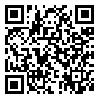BibTeX | RIS | EndNote | Medlars | ProCite | Reference Manager | RefWorks
Send citation to:
URL: http://jdisabilstud.org/article-1-2175-en.html
2- Professor, Department of Clinical Psychology, Faculty of Psychology and Educational Sciences, Allameh Tabataba'i University, Tehran, Iran
3- Associate Professor, Department of Educational Psychology, Faculty of Psychology and Educational Sciences, Allameh Tabataba'i University, Tehran, Iran
4- Assistant Professor, Department of General Psychology, Islamic Azad University, Science and Research Branch, Tehran, Iran
Background & Objectives: Divorced women are one of the most vulnerable groups in society who face psychological, economic, social, and cultural problems. One of the issues that psychologists consider about divorced women is alexithymia. Alexithymia includes the inability to cognitively process emotional information and limitations in regulating emotions. Another characteristics that are particularly important to check in divorced women is resilience. It is an ability and skill through which people can easily guide their life process despite the unfavorable situation and difficulties ahead. Mental well–being is another factor that is particularly important to examine in divorced women. Divorced women face various disabilities and problems in their personal and social life, and their potential empowerment should be included in the programs of relevant organizations and professionals. One of the most important and effective interventions in the field of psychology is group therapy. This study aimed to evaluate the effectiveness of positive group therapy on the alexithymia, resilience, and mental well–being of divorced women.
Methods: This research method was quasi–experimental with a pretest–posttest design with a control group. The statistical population included all divorced women referred to the welfare organization of Tehran Province, Iran, from September 2019 to March 2020. They were 263 women, of whom 30 were qualified volunteers. Samples were selected by purposive sampling and randomly divided into 2 groups (15 in the experimental group and 15 in the control group). Subjects in both groups completed Toronto Alexithymia Scale (Bagby et al., 1994), Connor–Davidson Resilience Scale (Connor & Davidson, 2003), and Mental Well–Being Scale (Keyes & Magyar–Moe, 2003) in the pretest and posttest. The experimental group underwent a positive group therapy intervention for 8 sessions, while the control group did not receive any intervention during this period. In this research, descriptive statistics (mean and standard deviation) and inferential statistics (analysis of covariance test) were used to analyze the data. All statistical calculations were done by SPSS version 24 software. A significance level of 0.05 was considered for all tests.
Results: The analysis of covariance showed that after eliminating the effect of the pretest, the mean scores of the alexithymia variable in the posttest compared to the pretest in the experimental group and to the control group decreased significantly (p˂0.001). Also, the mean scores of the resilience variable in the posttest compared to pretest and the mean scores of the mental well–being variable in the posttest compared to the pretest in the experimental group and compared to the control group increased significantly (p˂0.001). On the other hand, the results related to eta squares showed that positive group therapy was 56.9% effective in alexithymia, 46.1% in resilience and 64.3% in the mental well–being of divorced women.
Conclusion: According to the research findings, positive group therapy can be used to reduce alexithymia and increase the resilience and mental well–being of divorced women.
| Rights and permissions | |
 |
This work is licensed under a Creative Commons Attribution-NonCommercial 4.0 International License. |



